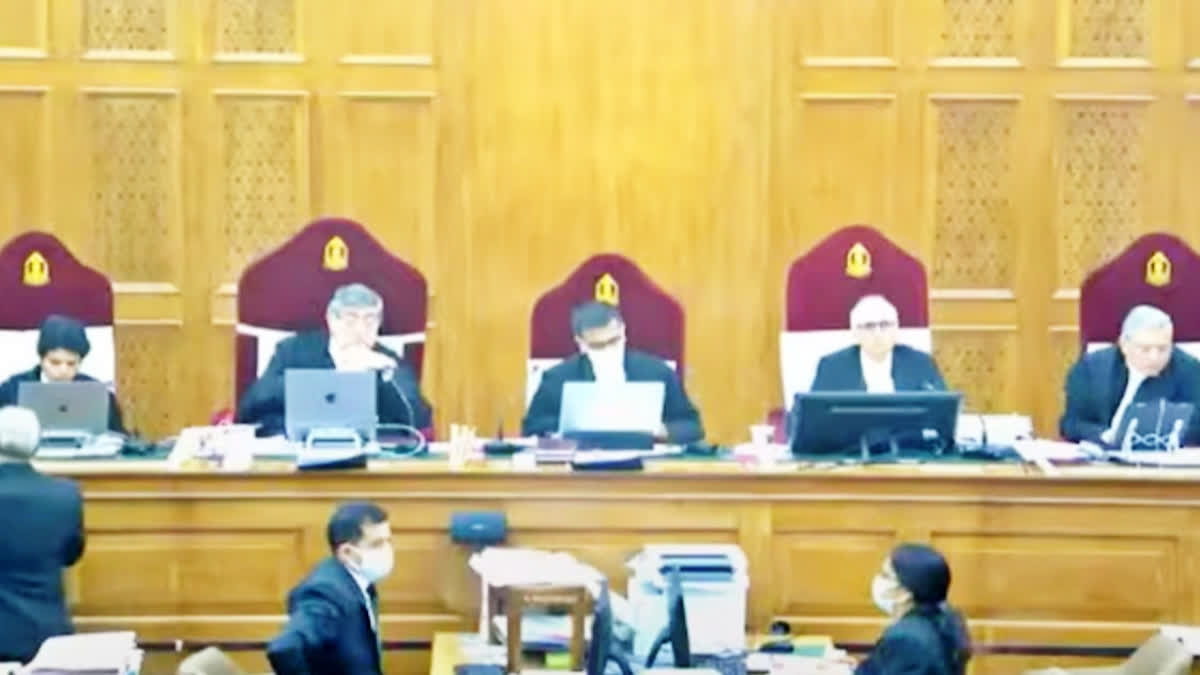New Delhi: The Supreme Court on Thursday asked the central government to do some thinking over removing the problems or barriers like the inability to open a joint bank account, the inability to make a partner nominee, and other such issues in homosexual couples as their marriage is not recognized legally. It said that it doesn't disagree that it is the Parliament's job to legislate over same-sex marriage but there has to be some solution to the problems that same-sex couples face.
The five-judge Constitution Bench comprising of the Chief Justice of India DY Chandrachud, Justice Sanjay Kishan Kaul, Justice S Ravindra Bhat, Justice Hima Kohli, and Justice PS Narasimha is dealing with a batch of petitions pertaining to 'marriage equality rights for LGBTQIA+ community.
Solicitor General Tushar Mehta appearing for the centre submitted before the court that the government shares their (homosexuals') concerns and "we must find a solution to that problem". "We would like the government to make a statement for that," said CJI DY Chandrachud leading the five-judge constitution bench.
The CJI said the bench would resume hearing the matter on Wednesday, May 3 by which the Solicitor General should get a response from the government on the problems faced by the LGBTQIA+ community and whether the government is doing something about it.
During the hearing on Thursday, the SG argued on the difficult legislative amendments that would have to be carried out in case the community is granted recognition for marriage. Mehta explained that there are different provisions for man and woman or husband and wife under various laws and the terms man and woman or husband and wife would have to be changed that would sound "absurd".
Also read: Same-sex marriage not 'urban-elitist': SC opposes Centre's stand; hearing to continue on Thursday
He said that the movement of LGBTQIA+ started some 20-30 years ago so they don't even have any credible data on things like how many of them adopt etc. to examine the workability of other laws in the community. Here, the CJI interrupted SG and said that it wasn't the case. He said that "some of our finest temples reflecting the finest architecture shows the depth of our culture which included the community".
"Look at the profound nature of our culture. What happened unfortunately was from 1857, we imposed British morality on our diverse culture. We were very inclusive...that's why we were tolerant to so many invaders as well," said the CJI. He added that the court understands its limitation as a judiciary but there are so many issues on the administrative side for which it can act as a facilitator.
The CJI said that it would like the government to assist the court in a non-adversarial manner. "Judges gave examples of Vishakha guidelines, acted on domestic violence etc where the court laid down the guidelines and then Acts were passed on issues that covered wider ambit which the court couldn't have possibly seen," he said.
SG Mehta said that to remove the problems, marriage recognition might not be necessary. The court discussed how the registration of marriage was not mandatory and how many people from rural India, people from their parents' generation, and people even from today's generation, don't get their marriage registered. Justice Ravindra Bhat said that even his marriage is not registered.
The court said that the concept of marriage was developed because of long cohabitation and aspects arising out of it. It told SG Mehta that he made strong points on why the Parliament has the right to legislate but now since the law has gone so far (decriminalization of 377), what does the government want to do on cohabitation?
CJI said that homosexual couples should be given a sense of security, and identity. The bench remarked that even live-in relationships are not granted sanctity but various issues that arise in there are dealt by law. Similarly, same-sex couples can also be facilitated. SG said that the right to love, cohabit, and choose one's partner, and sexual orientation is a fundamental right but seeking recognition of marriage is not a fundamental right.
He said that there are various kinds of ceremonies that people do to celebrate their association but not all are given legal recognition. He gave the example of a Gujarat girl who married herself. Court however said that once the right to cohabit is recognised as a fundamental right, the state has an obligation to recognise the cohabitation. "There is a large number of relationships...all need not be recognised by the state...It can recognise only when legitimate state interest is required," the SG replied.
"Zinc and brass can both be metals but they are treated differently," said SG. Arguing further he submitted that after decriminalization, stigma is removed to which the court strongly objected. "They are very badly stigmatized," Justice Ravindra Bhat said.
Also read: Consider leaving questions raised in same sex marriage pleas to Parliament: Centre to SC



